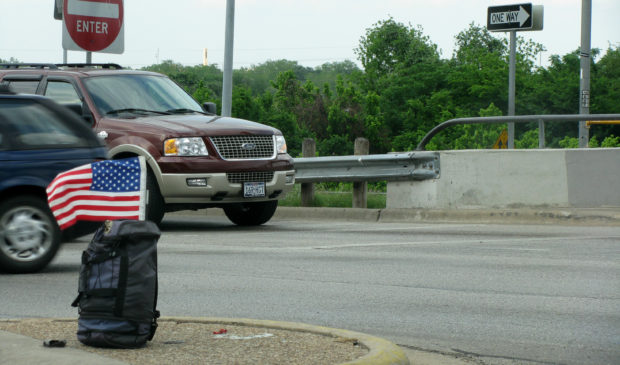Notley/Monitor Poll: Austinites want reinstated camping bans on the homeless enforced
Thursday, February 16, 2023 by
Chad Swiatecki Austin residents feel the city isn’t doing enough to manage the effects of homelessness throughout the area, according to a January/February poll of 429 voters commissioned by Notley and conducted by national pollster Change Research for the Austin Monitor.
Homelessness has remained as one of Austin’s most hot-button issues in recent years. The poll found that, nearly four years after a controversial City Council vote to lessen penalties for camping and occupying public spaces, residents want stricter enforcement on the bans that were later reinstated.
A clear majority (55 percent) want the camping ban to be more strongly enforced by Austin police (a class C misdemeanor fine of up to $500 is currently the harshest penalty available under state law). Twenty-three percent said they support current enforcement levels, with the remaining 22 percent of respondents pushing for less enforcement of the camping ban.
Hispanic-identifying respondents had the laxest view on the bans, with 46 percent wanting more enforcement and 28 percent supporting a reduction in enforcement.
Support for increased enforcement was roughly identical among respondents with and without a college education, with women showing slightly less support for increased enforcement than men.
Support for increased enforcement was strongest among white non-college educated respondents (58 percent) while the push for reduced enforcement was strongest (25 percent) among non-college-educated people of color.
Mental health and substance abuse issues and lack of affordable housing were essentially tied (31 percent and 30 percent, respectively) when the survey asked respondents their views on the primary cause of homelessness in Austin. Twenty-two percent of respondents identified the city’s reputation as a haven for the homeless as the cause, while 8 percent chose increased gentrification. The catchall “something else” answer drew 9 percent support.
Men and women held noticeably different viewpoints on the causes of homelessness, with 35 percent of women citing mental health and substance abuse compared to 26 percent of men who held the same view.
Among men, the city’s reputation for homelessness was the top answer (28 percent) while only 17 percent of women respondents held the same opinion. That gap was even wider among respondents over the age of 50, with 42 percent of men in that cohort saying Austin’s homelessness reputation was the top cause, compared to only 20 percent for women in the same age group.
While the number of people experiencing homelessness has steadily increased in recent decades as the local real estate market surged upward, the issue became a political flashpoint in 2019 when City Council voted to remove the bans on camping and standing in public places. Supporters of that action argued the fines and legal actions against the homeless made shelter and stable housing further out of reach, with advocates for the homeless pushing for more supportive housing and services.
Residents opposed to the relaxed enforcement and the quick appearance of tent encampments across the city placed a referendum on the ballot in early 2021 to reinstate the bans. Voters strongly supported that referendum, and the city began taking steps to enforce the rules just ahead of the effective date of a state law outlawing camping by the homeless.
Since then, the city has put considerable time and resources into trying to find ways to increase shelter and permanent housing options for the homeless, purchasing hotels to use for temporary housing and committing federal stimulus money along with philanthropic contributions to build more deeply affordable housing and provide related support services.
Work continues to gradually disperse homeless encampments, with the Housing-focused Encampment Assistance Link, or HEAL initiative, selecting the highest-priority groups to deliver immediate aid and housing as the city’s capacity allows.
In a poll commissioned by Notley for the Austin Monitor, Change Research surveyed 429 voters in Austin, Texas, from Jan. 28-Feb. 1, 2023, using a sample reflective of the electorate. Post-stratification weighting was performed on age, gender, race/ethnicity, education, ZIP code, and 2020 presidential vote, with weighting parameters based on voter file data and election results based on numbers released by the Texas Secretary of State. The modeled margin of error for the survey is 5.3 percent. Complete survey results and methodology are available here.
The Austin Monitor’s work is made possible by donations from the community. Though our reporting covers donors from time to time, we are careful to keep business and editorial efforts separate while maintaining transparency. A complete list of donors is available here, and our code of ethics is explained here.
You're a community leader
And we’re honored you look to us for serious, in-depth news. You know a strong community needs local and dedicated watchdog reporting. We’re here for you and that won’t change. Now will you take the powerful next step and support our nonprofit news organization?









